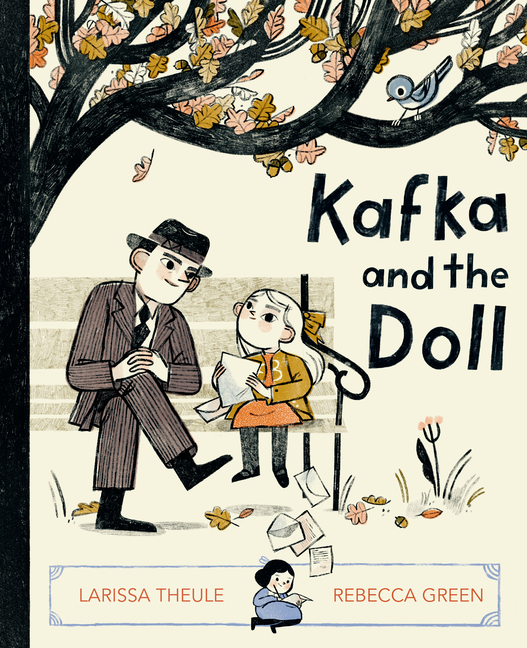Book Descriptions
for Kafka and the Doll by Larissa Theule and Rebecca Green
From Cooperative Children's Book Center (CCBC)
In a park in Berlin in 1923, author Franz Kafka comes upon a little white girl, Irma, who is sad because her doll, Soupsy, is lost. Kafka takes to writing letters from Soupsy to Irma, describing her adventures and eventually—as Kafka grows ill with tuberculosis—ending the letters in a thoughtful and hopeful way. (The doll won’t be returning, but she’s got good things ahead: She’s off on an Antarctic expedition.) Soupsy’s bold adventures are inspiring to the girl and help her accept the loss of her doll. Children won’t have to know who Kafka is to appreciate this moving story about a stranger’s kindness and compassion. The digital art has a distinctly old-fashioned look, helping to relay that the story is set in times past. An author’s note explains that Kafka did, indeed, correspond with a young girl who had lost her doll, writing in the doll’s voice. Although the actual letters have been lost, Theule’s own imagination supplied the missing letters, though she acknowledges that there is no way she could have replicated Kafka’s distinctive writing style. (Ages 4-7)
CCBC Choices 2022. © Cooperative Children's Book Center, Univ. of Wisconsin - Madison, 2022. Used with permission.
From the Publisher
Based on a true story about Franz Kafka
Inspired by a true story, Kafka and the Doll recounts a remarkable gesture of kindness from one of the world's most bewildering and iconic writers. In the fall of 1923, Franz Kafka encountered a distraught little girl on a walk in the park. She'd lost her doll and was inconsolable. Kafka told her the doll wasn't lost, but instead, traveling the world and having grand adventures! And to reassure her, Kafka began delivering letters from the doll to the girl for weeks.
The legend of Kafka and the doll has captivated imaginations for decades as it reveals the playful and compassionate side of a man known for his dark and brooding tales. Kafka and the Doll is a testament to living life to the fullest and to the life-changing power of storytelling.
Inspired by a true story, Kafka and the Doll recounts a remarkable gesture of kindness from one of the world's most bewildering and iconic writers. In the fall of 1923, Franz Kafka encountered a distraught little girl on a walk in the park. She'd lost her doll and was inconsolable. Kafka told her the doll wasn't lost, but instead, traveling the world and having grand adventures! And to reassure her, Kafka began delivering letters from the doll to the girl for weeks.
The legend of Kafka and the doll has captivated imaginations for decades as it reveals the playful and compassionate side of a man known for his dark and brooding tales. Kafka and the Doll is a testament to living life to the fullest and to the life-changing power of storytelling.
Publisher description retrieved from Google Books.


